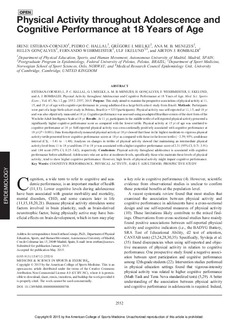Physical activity throughout adolescence and cognitive performance at 18 years of age
Esteban-Cornejo, Irene; Hallal, Pedro C.; Mielke, Grégory; Menezes, Ana Maria B.; Goncalves, Helen; Wehrmeister, Fernando César; Ekelund, Ulf; Rombaldi, Airton J.
Journal article, Peer reviewed
Permanent lenke
http://hdl.handle.net/11250/2384130Utgivelsesdato
2015-05Metadata
Vis full innførselSamlinger
- Artikler / Articles [2119]
Originalversjon
Medicine & Science in Sports & Exercise. 2015, 47, 2552–2557. 10.1249/MSS.0000000000000706Sammendrag
Purpose: This study aimed to examine the prospective associations of physical activity at 11, 15, and 18 yr of age with cognitive performance in young adulthood in a large birth cohort study from Brazil.
Methods: Participants were part of a large birth cohort study in Pelotas, Brazil (n = 3235 participants). Physical activity was self-reported at 11, 15, and 18 yr and was also objectively measured at 18 yr. Cognitive performance was assessed using an adapted Brazilian version of the short form of the Wechsler Adult Intelligence Scale at 18 yr.
Results: At 11 yr, participants in the middle tertile of self-reported physical activity presented a significantly higher cognitive performance score as compared with the lowest tertile. Physical activity at 15 yr of age was unrelated to cognitive performance at 18 yr. Self-reported physical activity was cross-sectionally positively associated with cognitive performance at 18 yr (P < 0.001). Data from objectively measured physical activity at 18 yr showed that those in the highest moderate-to-vigorous physical activity tertile presented lower cognitive performance scores at 18 yr as compared with those in the lowest tertile (-2.59; 95% confidence interval (CI), -3.41 to -1.48). Analyses on changes in tertiles of physical activity showed that maintaining an intermediate physical activity level from 11 to 18 yr and from 15 to 18 yr was associated with a higher cognitive performance score of 2.31 (95% CI, 0.71–3.91) and 1.84 score (95% CI, 0.25–3.42), respectively.
Conclusions: Physical activity throughout adolescence is associated with cognitive performance before adulthood. Adolescents who are active at moderate levels, specifically those who maintain these levels of physical activity, tend to show higher cognitive performance. However, high levels of physical activity might impair cognitive performance.
Beskrivelse
This is an open-access article distributed under the terms of the Creative Commons Attribution-Non Commercial License 4.0 (CCBY-NC), where it is permissible to download, share, remix, transform, and buildup the work provided it is properly cited. The work cannot be used commercially.
